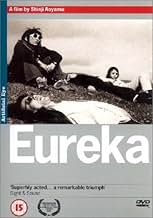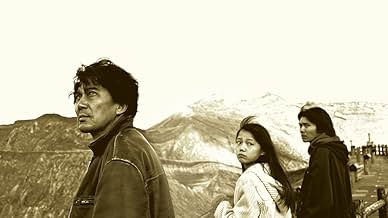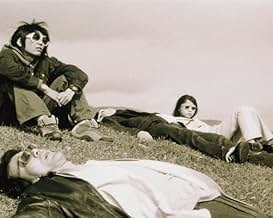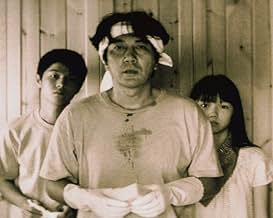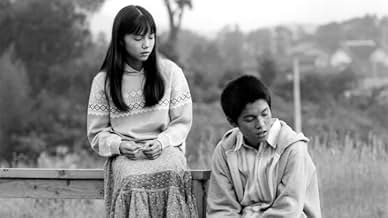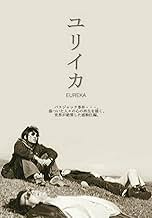NOTE IMDb
7,7/10
4,5 k
MA NOTE
Ajouter une intrigue dans votre langueThe traumatized survivors of a murderous bus hijacking come together and take a road trip to attempt to overcome their damaged selves. Meanwhile a serial killer is on the loose.The traumatized survivors of a murderous bus hijacking come together and take a road trip to attempt to overcome their damaged selves. Meanwhile a serial killer is on the loose.The traumatized survivors of a murderous bus hijacking come together and take a road trip to attempt to overcome their damaged selves. Meanwhile a serial killer is on the loose.
- Réalisation
- Scénario
- Casting principal
- Récompenses
- 4 victoires et 2 nominations au total
Avis à la une
It has been almost 6 years since I saw this film, yet this film can stick with me and still offer me things.
After a tragic incident of violence, a bus driver tries to find two other teen-aged survivors, a brother and sister. The sparse black and white camera work provide an insight into the bleak emotional landscape as they just stumble through as "walking dead". Having lost a father, I can identify with the characters. What is touching is the lack of communication and dialogue between the actors (whic includes the lead of the Japanese "Shall We Dance" ). Yet there is love and communication made even by just the thumping on bus walls. Words fail them.
The camera work is bleak yet stunning in composition and texture. Minimal yet just enough to feel the principals trying to find meaning in life. One can also speak of the Japanese economic downturn and the resulting introspective dramatic films such as Hirokazu's "After Life". If have experienced grief or if you'd like to find some insight into it, this may be a film. It seemed shorter than the four hours, but you are forewarned.
After a tragic incident of violence, a bus driver tries to find two other teen-aged survivors, a brother and sister. The sparse black and white camera work provide an insight into the bleak emotional landscape as they just stumble through as "walking dead". Having lost a father, I can identify with the characters. What is touching is the lack of communication and dialogue between the actors (whic includes the lead of the Japanese "Shall We Dance" ). Yet there is love and communication made even by just the thumping on bus walls. Words fail them.
The camera work is bleak yet stunning in composition and texture. Minimal yet just enough to feel the principals trying to find meaning in life. One can also speak of the Japanese economic downturn and the resulting introspective dramatic films such as Hirokazu's "After Life". If have experienced grief or if you'd like to find some insight into it, this may be a film. It seemed shorter than the four hours, but you are forewarned.
Eureka tells an enormously soul searching and moving story about three people's attempt to find meaning and purpose after experiencing a grizzly "busjack" (i.e. a bus hijack). Thus, its "subject matter" and the problem with which it deals is as old as philosophy itself: finding meaning and hope in a world where such senseless acts of violence and evil occurs. The three characters are Kozue (girl) and Naoki (boy), who are middle school aged siblings, and Makoto, who is the driver of the hijacked bus. They are eventually joined by the children's college-aged uncle, Akihiko (who also provides some memorable comedic moments).
There's not too much dialog in Eureka, as Kozue and Naoki are mute throughout much of the film (as a result of their trauma), but we can sense the confusing and searing emotions that lie just beneath their silence. Director Shinji Aoyama (wisely) lets the story and the characters unfold / develop at a very deliberate and slow pace, eschewing quick cutting and montage in favor of carefully crafted compositions within the vast cinemascope frame. Due to its realistic style, at times Eureka feels like a documentary.
Having said this, however, I can also say confidently that many will be put off by Eureka simply due to its epic running time (= 3 hours 37 minutes minus the credits). But let me just remark personally that although it _is_ long, Eureka definitely _feels_ a lot shorter (after it's over) than most 2 hour Hollywood films. (In fact, I don't think that Eureka would have worked as a "2 hour film"--for roughly the same reason that a "Reader's Digest" version of War and Peace wouldn't be as powerful as the full-length novel.) Don't get me wrong: Eureka is demanding (this is a "thinking person's" film), but it is not overly daunting. This is a daring film that asks a lot of its viewers, but which delivers much by way of emotional payoff (to those who persevere).
Eureka eventually turns into a kind of existential road movie, as the four characters try to "start over" by taking a trip on Makoto's new bus. And although I won't give it away, Eureka has an ending that is truly beautiful, quietly moving, and charged with a glimmer of hope.
Finally, although it is rarely heard in the film, the original musical score by Aoyama and Isao Yamada really adds emotional resonance whenever it plays. It's unforgettable and simultaneously beautiful and elegiac. Overall, I consider Eureka to be a great example of "humanistic" filmmaking in the tradition of Kurosawa and Ozu. Only time will tell whether or not it will be considered a masterpiece, but in my book Shinji Aoyama has created one of the truly unforgettable films of 2001.
There's not too much dialog in Eureka, as Kozue and Naoki are mute throughout much of the film (as a result of their trauma), but we can sense the confusing and searing emotions that lie just beneath their silence. Director Shinji Aoyama (wisely) lets the story and the characters unfold / develop at a very deliberate and slow pace, eschewing quick cutting and montage in favor of carefully crafted compositions within the vast cinemascope frame. Due to its realistic style, at times Eureka feels like a documentary.
Having said this, however, I can also say confidently that many will be put off by Eureka simply due to its epic running time (= 3 hours 37 minutes minus the credits). But let me just remark personally that although it _is_ long, Eureka definitely _feels_ a lot shorter (after it's over) than most 2 hour Hollywood films. (In fact, I don't think that Eureka would have worked as a "2 hour film"--for roughly the same reason that a "Reader's Digest" version of War and Peace wouldn't be as powerful as the full-length novel.) Don't get me wrong: Eureka is demanding (this is a "thinking person's" film), but it is not overly daunting. This is a daring film that asks a lot of its viewers, but which delivers much by way of emotional payoff (to those who persevere).
Eureka eventually turns into a kind of existential road movie, as the four characters try to "start over" by taking a trip on Makoto's new bus. And although I won't give it away, Eureka has an ending that is truly beautiful, quietly moving, and charged with a glimmer of hope.
Finally, although it is rarely heard in the film, the original musical score by Aoyama and Isao Yamada really adds emotional resonance whenever it plays. It's unforgettable and simultaneously beautiful and elegiac. Overall, I consider Eureka to be a great example of "humanistic" filmmaking in the tradition of Kurosawa and Ozu. Only time will tell whether or not it will be considered a masterpiece, but in my book Shinji Aoyama has created one of the truly unforgettable films of 2001.
Some people have a disliking for Japanese cinema because the movies tend to be slow paced, minimalistic. If you're one of them - skip EUREKA is all you need to know. The movie moves along at a snail's pace on Sunday - at 90 minutes most movies are just coming to their explosive and or dramatic climax, but at that point I was still wondering what Eureka was about. 2 hours later the movie finally finishes - and I was still wondering what it was all about.
EUREKA is a movie of epic length, that raises other challenging questions like "Why is it 3.5 hours long?", "Why is it black and white?", "Is this all going somewhere?" and "Is it nearly finished yet?". Clearly director Shinji Aoyama wants his movie to make us think. And in 3.5 hours of black and white imagery and minimal dialogue, your mind certainly does have ample opportunity to wander.
Maybe I should have checked the "Director's Statement" that is included on the UK DVD before watching the movie. Then I'd have known what he was trying to say, and could have spent my time deciding if he said it effectively instead. Whether that would have been more fun or less I don't know though.
Not to say that I didn't enjoy watching EUREKA - for most of the run time I did. It's very well acted, has some good cinematography and is generally quite unusual. I'd have preferred it to have been shorter though, or had more going on - even colour photography would have helped to keep my attention on the screen with a little less effort.
I do think it's a good movie though, but... it just didn't need to be 3.5 hours to make its point or build its characters. Or maybe it did need 3.5 hours to do that, but Shinji Aoyama used his time badly - because at the end I still didn't really have a grasp on who the characters were 'deep down', or what the point of sharing their story with us was. Perhaps it's just that it's a movie aimed for better minds than mine to truly appreciate though. Certainly the length and style are going to keep any hopes of mainstream appreciation at bay.
EUREKA is a movie of epic length, that raises other challenging questions like "Why is it 3.5 hours long?", "Why is it black and white?", "Is this all going somewhere?" and "Is it nearly finished yet?". Clearly director Shinji Aoyama wants his movie to make us think. And in 3.5 hours of black and white imagery and minimal dialogue, your mind certainly does have ample opportunity to wander.
Maybe I should have checked the "Director's Statement" that is included on the UK DVD before watching the movie. Then I'd have known what he was trying to say, and could have spent my time deciding if he said it effectively instead. Whether that would have been more fun or less I don't know though.
Not to say that I didn't enjoy watching EUREKA - for most of the run time I did. It's very well acted, has some good cinematography and is generally quite unusual. I'd have preferred it to have been shorter though, or had more going on - even colour photography would have helped to keep my attention on the screen with a little less effort.
I do think it's a good movie though, but... it just didn't need to be 3.5 hours to make its point or build its characters. Or maybe it did need 3.5 hours to do that, but Shinji Aoyama used his time badly - because at the end I still didn't really have a grasp on who the characters were 'deep down', or what the point of sharing their story with us was. Perhaps it's just that it's a movie aimed for better minds than mine to truly appreciate though. Certainly the length and style are going to keep any hopes of mainstream appreciation at bay.
10gmwhite
I wouldn't give many films a score of ten unless they were truly outstanding, not just better, but in a whole different league. It is a grade reserved for the likes of (if I may indulge in a little subjectivity) Tarkovsky's Stalker;, Kitano's Hana-Bi, In the Mood for Love' by Wong Kar-wai, Dreyer's Passion of Joan of Arc, Ozu's Tokyo Story; and very few others. It is more than mere technical brilliance, top-class acting, superb plot or camera-work. What each of these films possesses is sheer humanity, simultaneously painful and life-affirming.
Eureka deserves to stand proudly in such company, for Eureka is a film that is so human it makes most others seem either shallow, over-wrought, or just pretentious. Eureka's plot is a simple, its action, dialog and soundtrack is sparse, camera movement is minimal. The sepia-toned photography is indeed a marvel to look at, and each of the actors performs with such restrained naturalness that they don't seem like performances at all. The result is a film that is less like a story being told, and more like an experience that is undergone or a journey shared. If there is any 'art' involved, it is in producing a film so fragile, yet so accessible, so desperately and painfully human out of material so grueling and alien to most of us fortunate viewers. And in this respect, the movement of Eureka mirrors that of the protagonists, the three traumatised survivors of a bloody bus high-jacking. They are a brother and sister,and the bus driver himself. In the wake of the tragedy, after some months of wandering and inactivity, they are drawn back together and set out on a bus.
As may be gathered, this film is very much about the aftermath of tragedy, about how certain experiences may mark one off from the rest of society, and how with silence, stillness and human company, and most importantly, the passing of time, some form of healing may be glimpsed. And it is just a glimpse. Though the final scene is indeed moving, there is no big payoff, anymore than there might be in life itself. There is only the artistry of the film itself to transfigure the story, and it does this with such quiet, unobtrusive sympathy, that to call it 'artistry' seems almost to malign it. I haven't seen Aoyama's other films, so I can't say whether he is destined for a Tarkovsky-, Dreyer- or Ozu-like elevation to the cinematic pantheon, but this film is a refreshing example of the kind of deep humanity of the best directors, the best artists, one that marks a perfect 10 off from all the rest.
Eureka deserves to stand proudly in such company, for Eureka is a film that is so human it makes most others seem either shallow, over-wrought, or just pretentious. Eureka's plot is a simple, its action, dialog and soundtrack is sparse, camera movement is minimal. The sepia-toned photography is indeed a marvel to look at, and each of the actors performs with such restrained naturalness that they don't seem like performances at all. The result is a film that is less like a story being told, and more like an experience that is undergone or a journey shared. If there is any 'art' involved, it is in producing a film so fragile, yet so accessible, so desperately and painfully human out of material so grueling and alien to most of us fortunate viewers. And in this respect, the movement of Eureka mirrors that of the protagonists, the three traumatised survivors of a bloody bus high-jacking. They are a brother and sister,and the bus driver himself. In the wake of the tragedy, after some months of wandering and inactivity, they are drawn back together and set out on a bus.
As may be gathered, this film is very much about the aftermath of tragedy, about how certain experiences may mark one off from the rest of society, and how with silence, stillness and human company, and most importantly, the passing of time, some form of healing may be glimpsed. And it is just a glimpse. Though the final scene is indeed moving, there is no big payoff, anymore than there might be in life itself. There is only the artistry of the film itself to transfigure the story, and it does this with such quiet, unobtrusive sympathy, that to call it 'artistry' seems almost to malign it. I haven't seen Aoyama's other films, so I can't say whether he is destined for a Tarkovsky-, Dreyer- or Ozu-like elevation to the cinematic pantheon, but this film is a refreshing example of the kind of deep humanity of the best directors, the best artists, one that marks a perfect 10 off from all the rest.
10aapp22
During its epic 3,5 hours of duration I managed to make some coffee, fry some eggs and let me assure you that I was a totally different man when it ended - It made me think about the real meaning of life, its beauty and subsequent horrors which we all go through at some point in our existence.
This is sophisticated film-making at its best.
This is sophisticated film-making at its best.
Le saviez-vous
- AnecdotesThe brother and sister in the film are played by real life brother and sister Aoi Miyazaki and Masaru Miyazaki.
- Citations
Makoto Sawai: Do you think one can live only for others?
Meilleurs choix
Connectez-vous pour évaluer et suivre la liste de favoris afin de recevoir des recommandations personnalisées
- How long is Eureka?Alimenté par Alexa
Détails
Box-office
- Montant brut aux États-Unis et au Canada
- 49 388 $US
- Montant brut mondial
- 49 388 $US
- Durée3 heures 37 minutes
- Couleur
- Mixage
- Rapport de forme
- 2.35 : 1
Contribuer à cette page
Suggérer une modification ou ajouter du contenu manquant


